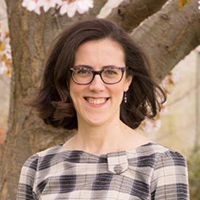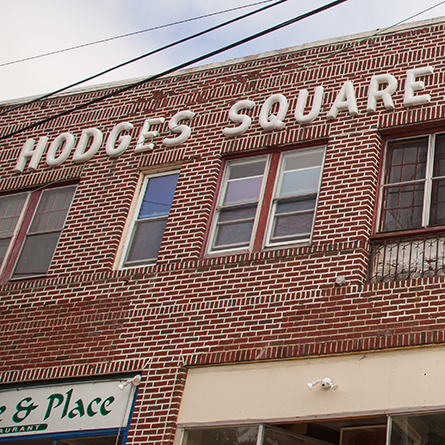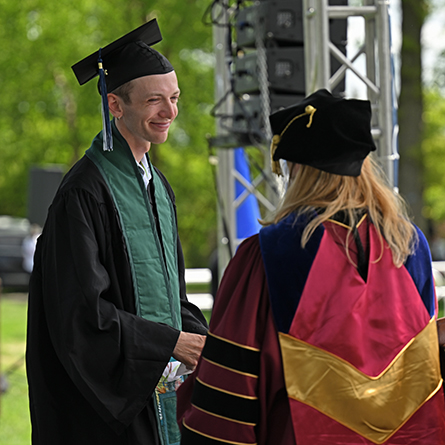
Architectural Design students take on New London challenge
New London City Planner Sybil Tetteh had a challenge for the students in Professor Bill Pollack’s "Architectural Design II" course: Design a building that could revitalize Hodges Square, a mixed residential and commercial area where I-95 cuts the city in half.
After talking to local business owners, studying the area and considering various challenges, Jacob Brill-Weil ’20 wondered how he could bring together the Connecticut College and United States Coast Guard Academy students to the north with the local residents to the south.
His answer: food. But not just any food. Brill-Weil designed a premium food court that would offer a variety of options at affordable prices, as well as space for local vendors and community displays.
“I wanted to avoid creating something that could become a stepping stone for gentrification, and instead be something that connected existing communities,” Brill-Weil said.
Tetteh was impressed with Brill-Weil’s proposal, as well as the designs of his classmates, which included a boutique hotel, a community garden greenhouse and an arts center.
“Some of the ideas I hadn’t thought of before and I was like, ‘Wow,’” Tetteh said. “The students were really connected and really grounded in terms of practicality. The spectrum of design speaks to what could happen in the next year or two or in the next 20 with the right developers in place.”
The innovative, hands-on project is part of a new Career Informed Learning initiative, a project-based learning approach to education that brings real-life work challenges into the classroom.
“The students benefit from a sustained interaction with a career expert, who is someone at the top of her/his field,” said Noel Garrett, dean of academic support and director of the College’s Academic Resource Center. “This behind-the-scenes examination of how a business works, or how professionals solve real-world challenges, is unique to Connecticut College.”
At the heart of this initiative is a unique collaboration that combines the Academic Resource Center’s focus on developing powerful learning skills with the applied learning opportunities offered by alumni identified through the College’s Office of Career and Professional Development. The office, which was recognized by the Princeton Review as one of the top 20 programs in North America, coordinates the logistics of putting students in touch with alumni and parents who are industry leaders.
“Career Informed Learning enables all students at the College to have the opportunity to work within teams to strengthen their career-related skills and see the impact of their work, which makes them more competitive in the marketplace for internships and full-time jobs,” said Persephone L. Hall, the Hale Family Director of Career and Professional Development.
After completing Pollack’s course this past spring, Emily Hesse ’19 spent the summer interning with an architecture firm.
“I got to see how the creative design process I learned about this past year is put into professional practice,” she said.
“Whether I choose to pursue architecture after graduation or not, learning how to work with a client to develop a concept is an invaluable lesson.”

